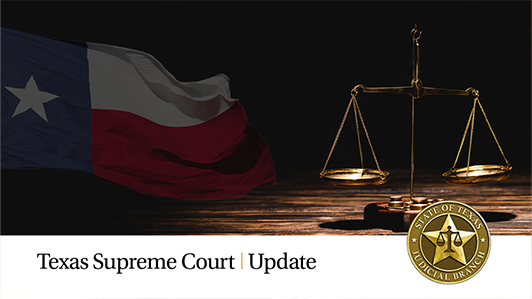
The following are summaries of selected opinions issued by the Texas Supreme Court in March 2025. These summaries are prepared by court staff as a courtesy. They are not a substitute for the actual opinions. The summaries are overviews of the opinions; please review the entire opinions.
GEO Grp. v. Hegar, ___ S.W.3d ___, 2025 WL ___ (Tex. Mar. 14, 2025) [23-0149]
The primary issue in this case is whether private, for-profit business entities that detain federal and state inmates qualify as tax-exempt “agents” or “instrumentalities” of the government under the Tax Code and the Comptroller’s rules.
GEO owned and operated detention facilities in Texas, housing federal and state inmates in its facilities pursuant to contracts with federal, state, and county governments. When GEO failed to pay tax on purchases necessary to operate those facilities, the Comptroller assessed a sales and use tax deficiency against GEO. Following administrative proceedings challenging the deficiency, GEO paid the stipulated $3,937,103.71 tax due and filed suit for a taxpayer refund.
The trial court concluded that GEO failed to demonstrate “by clear and convincing evidence” that it qualified as a government “agent” or “instrumentality” entitled to a tax exemption as required. GEO appealed, arguing that the court erred by applying a heightened standard of review. The court of appeals affirmed.
The Supreme Court affirmed. Although the Court noted that the Tax Code’s mandated trial de novo requires a preponderance of the evidence standard of proof instead of the heightened clear and convincing standard, application of the lesser standard did not alter the outcome of the case. The Court held that entities entitled to tax exemption as government “agents” or “instrumentalities” are of a specific, narrow character: only entities that the government has unequivocally declared an “agent” or “instrumentality” or those that could reasonably be viewed as an arm of the government are included. The Court held that GEO’s mere performance of a governmental function like inmate detention was not sufficient.
Bertucci v. Watkins, ___ S.W.3d ___, 2025 WL ___ (Tex. March 14, 2025) [23-0329]
This case concerns issues of briefing waiver, fiduciary duties between partners, and defenses to summary judgment.
Bertucci and Watkins developed low-income-housing projects. They created a series of limited partnerships with themselves as limited partners. In 2014, Bertucci claimed to discover that Watkins misappropriated funds. Bertucci sued individually and derivatively on behalf of the companies. The parties filed cross-motions for summary judgment, and the trial court granted summary judgment for Watkins on all claims.
The court of appeals held that Bertucci failed to adequately brief issues regarding the derivative claims and thus affirmed the judgment in Watkins’s favor on those claims. It reversed the judgment on Bertucci’s individual breach-of-fiduciary-duty claims, concluding that fact issues existed as to those claims and on Watkins’s defenses of limitations, waiver, and ratification. Both parties petitioned for review.
The Supreme Court affirmed in part and reversed in part. It held that Bertucci sufficiently asserted arguments in his appellate briefing on behalf of the companies so as to avoid waiver. It next held that summary judgment was proper on Bertucci’s claim that Watkins owed fiduciary duties to Bertucci, individually. The court of appeals reversed on this issue on a ground that Bertucci raised for the first time in that court. Because the ground was not raised in the trial court, it could not form the basis for summary judgment. Finally, the Court held that fact issues precluded summary judgment in Watkins’s favor based on limitations and that the court of appeals did not err by declining to address an expert’s report or by holding that the Dead Man’s Rule barred certain testimony.
The Court reinstated summary judgment on the breach-of-fiduciary-duty claims Bertucci asserted in his individual capacity and remanded the case to the court of appeals to address the derivative claims.
SCTX Issues Per Curiam Opinion Address 15th Court of Appeals’ Jurisdiction
Misc. Docket No. 25-9013
Kelley v. Homminga1
Misc. Docket No. 25-9014
Devon Energy Prod. Co. v. Oliver2
Below is a summary of the orders:
Kelley v. Homminga and Devon Energy Prod. Co. v. Oliver, ___ S.W.3d ___, 2025 WL ___ (Tex. Mar. 14, 2025) (per curiam) [Misc. Docket Nos. 25-9013, 25-9014]
These administrative matters raise the question whether a party can appeal to the Fifteenth Court of Appeals even though the case is not within the court’s exclusive intermediate appellate jurisdiction.
In Kelley v. Homminga and Devon Energy v. Oliver, the defendants noticed their appeals to the Fifteenth Court while conceding that the appeals are not within the Fifteenth Court’s exclusive jurisdiction. Under Texas Rule of Appellate Procedure 27a, the plaintiffs in each case moved to transfer the appeal to the regional court of appeals that hears appeals from the relevant county. The Fifteenth Court issued letter rulings that the motions should be denied, reasoning that Government Code Sections 22.201(p) and 22.220(a) give the court general appellate jurisdiction over civil cases statewide and that there is no express statutory bar to noticing an appeal there. The potential transferee courts each filed letters stating their agreement or disagreement. Under Rule 27a, the Fifteenth Court forwarded the motions and letters to the Supreme Court for a decision.
The Supreme Court granted both transfer motions. In a per curiam opinion, the Court analyzed Government Code Sections 22.201, 22.216, 22.220, 22.221, and 73.001, which were amended in 2023 by the act creating the Fifteenth Court. The Court held that a fair reading of the act, discerned through a contextual reading of all its provisions, is that the Legislature intended the Fifteenth Court to hear (1) appeals and writs within its exclusive jurisdiction, and (2) appeals transferred into the court by the Supreme Court to equalize the courts of appeals’ dockets. Because the appeals fall into neither category, they were improperly taken to the Fifteenth Court.
ENDNOTES
